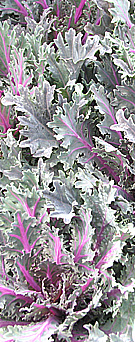Nitrogen deficiency in fruit and vegetables
NITROGEN DEFICIENCY IN GARDEN SOIL
The visual symptoms of nitrogen deficiency in plants grown in a poor quality soil lacking in nitrogen mean that it can be relatively easy to detect in many plant species.
Nitrogen deficiency symptoms include poor plant growth and leaves that are a pale green or yellowing because the plants is unable to make sufficient chlorophyll to make good growth.
Leaves of plants in this state are described as chlorotic.

SOCIETIES
NITROGEN DEFICIENCY IN FRUIT AND VEGETABLES
Nitrogen is essential for all plant growth - it forms part of the protoplasm of plant cells and chlorophyll.
The presence of Nitrogen in the soil promotes foliage, vigour and general growth.
Nitrogen is released into the soil as a result of bacterial activity, and is usually abundant by the end of the summer.
Nitrogen is easily lost from the soil by the effect of Winter rain.
A nutient deficiency of nitorgen can also happen when woody material like sawdust, sometimes contained in horse manure, is dug into the soil. The organisms in the soil will use nitrogen to break the wood shavings down, which makes it unavailable to any plants growing in that soil..

SYMPTOMS OF NITROGEN DEFICIENCY IN PLANTS
The main symptoms of nitrogen deficiency in all types of plants are
- Restricted or stunted root and top growth
- Stunted, thin shoots
- Upright , spindly growth
- Small pale green or yellow leaves
- Premature leaf fall
- Poor lateral growth development
These symptoms of nitrogen deficiency are common in the Brassicas - Cabbage, Cauliflower, Brussels Sprouts and Beetroot.
Potatoes affected by nitrogen deficiency are stunted and the number of tubers much reduced.
Fruit trees and fruit bushes with a nitrogen deficiency exhibit short thin shoot growth, sparse foliage in adddition to the main symptoms with few blossoms and any fruits that are produced are small and highly coloured.
CORRECTING NITROGEN DEFICIENCY IN THE SOIL
Nitrogen Deficiency can be corrected by the application of nitrogenous fertilizers and manures such as sulphate of ammonia, dried blood and sodium sulphate and well rotted farmyard manure (provided that the manure does not contain wood shavings) or chicken manure pellets.
Nitrogen deficiency in plants can be also prevented in the short term by using grass mowings from you lawn as a mulch and foliar feeding with organic manure.
In the long term, the addition of organic material to the soil will maintain levels of nitrogen by producing a small but steady amount of nitrogen as it rots down.
Growing green manure crops in your garden to cover soil over the winter months will help to prevent nitrogen leaching from the garden soil, also using green manures
will help to fix additional nitrogen from the earth's atmosphere.